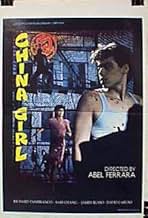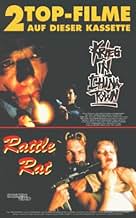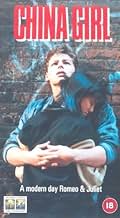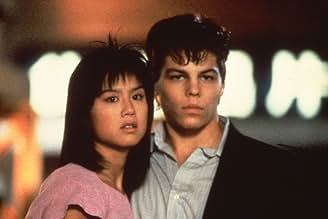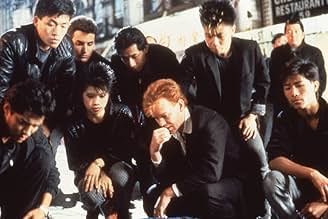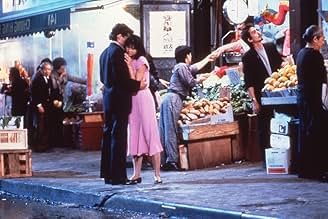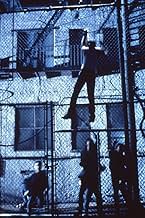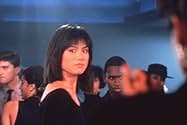China Girl
- 1987
- Tous publics
- 1h 30m
IMDb RATING
6.3/10
2.7K
YOUR RATING
An Italian boy and Chinese girl fall in love in New York, igniting a conflict between their ethnic gangs.An Italian boy and Chinese girl fall in love in New York, igniting a conflict between their ethnic gangs.An Italian boy and Chinese girl fall in love in New York, igniting a conflict between their ethnic gangs.
- Awards
- 1 nomination total
- Director
- Writer
- All cast & crew
- Production, box office & more at IMDbPro
Featured reviews
Chinese gangs vs. Italian gangs in NYC in 1987. Tony (Richard Panebianco) and Tye (Sari Chang) meet and fall in love. Meanwhile Tye's brother hates all Italians and Tony's friends hate Chinese.
If you've seen "West Side Story" you know how this ends--but a bit more tragically in this movie. Plotwise it's very obvious but it's beautifully done. Filmed with energy, beautifully atmospheric (the sets and lighting are incredible), and full of bursts of ultraviolence. Most of the roles are well acted, especially by James Russo, David Caruso (chewing the scenery) and Russell Wong. As the young lovers Panebianco and Chang are, unfortunately, not that good. In a way it's understandable--he was only 16 when this was made and it's the first role for both. They're both very attractive (Panebianco is pretty buff with a baby face; Chang is delicate and beautiful) but have little to do other than kiss and act like they love each other. That isn't believable either since they have zero sexual chemistry. Still, they are sympathetic characters. Also, in a nice touch, Panebianco shows more skin than Chang in their sex scene.
This is really obscure and it doesn't deserve it. It had almost no release in 1987 (there were no stars to sell it) and was never a big hit on cable or video. Also Chang never made another movie and Panebianco disappeared after making a few more films (Whatever happened to him? He showed a lot of promise.). That's too bad--this deserves a bigger audience. Worth watching on cable or renting.
If you've seen "West Side Story" you know how this ends--but a bit more tragically in this movie. Plotwise it's very obvious but it's beautifully done. Filmed with energy, beautifully atmospheric (the sets and lighting are incredible), and full of bursts of ultraviolence. Most of the roles are well acted, especially by James Russo, David Caruso (chewing the scenery) and Russell Wong. As the young lovers Panebianco and Chang are, unfortunately, not that good. In a way it's understandable--he was only 16 when this was made and it's the first role for both. They're both very attractive (Panebianco is pretty buff with a baby face; Chang is delicate and beautiful) but have little to do other than kiss and act like they love each other. That isn't believable either since they have zero sexual chemistry. Still, they are sympathetic characters. Also, in a nice touch, Panebianco shows more skin than Chang in their sex scene.
This is really obscure and it doesn't deserve it. It had almost no release in 1987 (there were no stars to sell it) and was never a big hit on cable or video. Also Chang never made another movie and Panebianco disappeared after making a few more films (Whatever happened to him? He showed a lot of promise.). That's too bad--this deserves a bigger audience. Worth watching on cable or renting.
Ferrara's China Girl, like many other films by the director, namely The king of new york and The funeral, is not afraid to approach tough political themes but also like these films just mentioned above is insufficient in its discourse and not captivating enough to make the viewer actually care about these issues.
The whole plot and message relyes on the relationship between Tony and Tye , the problem is that even though that is the case the film barely shows them bonding and falling for each other and we are just supposed to believe that they love each other even though the movie give us no reason whatsoever why they should. That for me is the biggest reason why the film is insufficient in its message and ends up just leaving the viewer indifferent to the issues there presented. With that said, it's not a bad movie, it has it's charm.
My review was written in May 1987 after a Cannes Film Festival Market screening.
"China Girl" is a masterfully directed, uncompromising drama and romance centering on gang rumbles (imaginary) between the neighboring Chinatown and Little Italy communities in New York City. Unspooled in the Cannes market but obviously worthy of official or sidebar slotting in the fest, extremely violent picture will need and stands a good chance of receiving critical approval to attract discerning audiences.
Nicholas St. John's screenplay hypothesizes an outbreak of a gang war when a Chinese restaurant opens in Italian territory (in reality, the current gang wars are strictly internecine between Chinese factions). In the midst of the battling a beautiful Chinese teenager (Sari Chang) falls in love with a pizza parlor gofer (Richard Panebianco). A la "West Side Story" and its source "Romeo and Juliet", the adults oppose the relationship and, more to the point, the Mafia dons and Chinese elder gangsters are in cahoots to maintain peace in their bordered territory, waiting to clamp down violently on both sets of youth gangs.
Director Abel Ferrara adopts a film noir visual style (lots of backlighting, wet streets at night and looming shadowplay) and it comes as no surprise that the pic builds to a tragic (and currently unfashionable) ending. He exacts potent thesping from the entire cast (several of the supporting players previously seen in Michael Cimino's "Year of the Dragon"), and with showy turns by James Russo as the hero's older brother and David Caruso as a hothead (given some of the film's funniest lines).
Russell Wong (as handsome as a shirt ad model) and sidekick Joey Chin dominate their scenes as the young Chinese gang leaders, while newcomer Panebianco is a forceful and charismatic young find. Title roler Sari Chang is called upon merely to be an idealized porcelain beauty and she fills the bill.
Ferrara, recently gaining notice as helmer of the pilot show for tv's "Crime Story" after such features as "Ms. 45" and "Fear City", creates remarkably vivid violent scenes, yet some of the picture's best work is in romantic interludes on the dancefloor of downtown clubs or a classic set piece of grief and rage set in a funeral parlor. Joe Delia's musical score plus some vibrant rock songs punch along the action insidiously.
"China Girl" is a masterfully directed, uncompromising drama and romance centering on gang rumbles (imaginary) between the neighboring Chinatown and Little Italy communities in New York City. Unspooled in the Cannes market but obviously worthy of official or sidebar slotting in the fest, extremely violent picture will need and stands a good chance of receiving critical approval to attract discerning audiences.
Nicholas St. John's screenplay hypothesizes an outbreak of a gang war when a Chinese restaurant opens in Italian territory (in reality, the current gang wars are strictly internecine between Chinese factions). In the midst of the battling a beautiful Chinese teenager (Sari Chang) falls in love with a pizza parlor gofer (Richard Panebianco). A la "West Side Story" and its source "Romeo and Juliet", the adults oppose the relationship and, more to the point, the Mafia dons and Chinese elder gangsters are in cahoots to maintain peace in their bordered territory, waiting to clamp down violently on both sets of youth gangs.
Director Abel Ferrara adopts a film noir visual style (lots of backlighting, wet streets at night and looming shadowplay) and it comes as no surprise that the pic builds to a tragic (and currently unfashionable) ending. He exacts potent thesping from the entire cast (several of the supporting players previously seen in Michael Cimino's "Year of the Dragon"), and with showy turns by James Russo as the hero's older brother and David Caruso as a hothead (given some of the film's funniest lines).
Russell Wong (as handsome as a shirt ad model) and sidekick Joey Chin dominate their scenes as the young Chinese gang leaders, while newcomer Panebianco is a forceful and charismatic young find. Title roler Sari Chang is called upon merely to be an idealized porcelain beauty and she fills the bill.
Ferrara, recently gaining notice as helmer of the pilot show for tv's "Crime Story" after such features as "Ms. 45" and "Fear City", creates remarkably vivid violent scenes, yet some of the picture's best work is in romantic interludes on the dancefloor of downtown clubs or a classic set piece of grief and rage set in a funeral parlor. Joe Delia's musical score plus some vibrant rock songs punch along the action insidiously.
Director Abel Ferrara hit's the street's with this modern take on Shakespeare's Romeo and Juliet set amongst waring Italian and Chinese gangs
this is more so the younger generation
as the much older and wiser mafia / triad figures set out for peace so they don't draw unwanted attention from the man in blue. However these young-guns make it a battleground and caught between it is two love-struck lovers; a Chinese girl Tayn-Hwa and Italian lad Tony Monte. They don't care about colour or race, despite what's happening all around them and what it could do to them or even loved ones.
There's no real surprises to the old hat, if simply low-key material (which was penned by Ferrara's collaborator Nicholas St. John), as we pretty much know how this dangerous story plays out and eventually finishes, however director Ferrara has a gritty, but devoted style and upbeat tempo that's uniquely his own that elevates the conventional framework with his striking eye for a sense of place and powerfully lasting imagery that's uncompromising. He does more than just direct from the screenplay. The concentration on the tough, smoky urban setting (with excellent location photography of New York's bordering neighbourhoods Chinatown and little Italy), helps build a seedy atmosphere where hatred and violence is simply waiting to boil over, as obsession and pride becomes a death wish. Ferrara polarises it very well, especially the conflict not between (which is still quite blistering), but within the same races seeking out honour in who they are ---- this is where it was at its strongest, because the forbidden love angle (while important to the plot's progression) did stall and take away from some of the underlining tension. Although outside of its pushy race card slant, it does feel like it's just building up these explosive acts to glorify its foreseeable conclusion. Joe Delia's melancholy score fits in perfectly.
The performances are down-to-earth and genuinely projected by its cast. Richard Panebianco and Sari Chang are sympathetically touching as the two lovebirds. An admirable James Russo and especially a hot-headed David Caruso bring an unstoppable intensity to their roles. Russell Wong is quite laid-back in a sound performance, in his quest to please his elders by controlling his gang and that of his wayward sister. Journeyman actor James Hong pops up, as well as Robert Miano as heavies.
You might call it lesser Ferrara compared to his other works, but it's involving and efficiently handled with his trademark raw and brutal edge shining through.
There's no real surprises to the old hat, if simply low-key material (which was penned by Ferrara's collaborator Nicholas St. John), as we pretty much know how this dangerous story plays out and eventually finishes, however director Ferrara has a gritty, but devoted style and upbeat tempo that's uniquely his own that elevates the conventional framework with his striking eye for a sense of place and powerfully lasting imagery that's uncompromising. He does more than just direct from the screenplay. The concentration on the tough, smoky urban setting (with excellent location photography of New York's bordering neighbourhoods Chinatown and little Italy), helps build a seedy atmosphere where hatred and violence is simply waiting to boil over, as obsession and pride becomes a death wish. Ferrara polarises it very well, especially the conflict not between (which is still quite blistering), but within the same races seeking out honour in who they are ---- this is where it was at its strongest, because the forbidden love angle (while important to the plot's progression) did stall and take away from some of the underlining tension. Although outside of its pushy race card slant, it does feel like it's just building up these explosive acts to glorify its foreseeable conclusion. Joe Delia's melancholy score fits in perfectly.
The performances are down-to-earth and genuinely projected by its cast. Richard Panebianco and Sari Chang are sympathetically touching as the two lovebirds. An admirable James Russo and especially a hot-headed David Caruso bring an unstoppable intensity to their roles. Russell Wong is quite laid-back in a sound performance, in his quest to please his elders by controlling his gang and that of his wayward sister. Journeyman actor James Hong pops up, as well as Robert Miano as heavies.
You might call it lesser Ferrara compared to his other works, but it's involving and efficiently handled with his trademark raw and brutal edge shining through.
William Shakespeare's eternal tale of young love gets yet another version in China Girl. Despite the racial tensions between the Chinese of Chinatown and the shrinking Italian population of Little Italy, Sari Chang and Richard Panebianco find each other and find love. Now if only those who might become their prospective in-laws will stop the hate.
China Girl was filmed completely on location in New York's neighborhoods of Little Italy and Chinatown. As the film says Little Italy where the fabled fictional Godfather had the Genco Olive Oil company is shrinking block by block as the Italians move out and a huge influx of Orientals move in and expand Chinatown. China Girl was done in 1987 so in twenty years the trend is exacerbated.
Players like James Russo, Russell Wong, and David Caruso have all gone on to bigger and better things, they're certainly more known than the leads are now. Still Panebianco and Chang are an attractive pair of kids.
The soundtrack is typical music from the Eighties in keeping with the times. Don't expect any songs for the ages like there were in West Side Story.
China Girl is a nice retelling of Romeo and Juliet a story that as long as there's life on planet Earth will never go out of style.
China Girl was filmed completely on location in New York's neighborhoods of Little Italy and Chinatown. As the film says Little Italy where the fabled fictional Godfather had the Genco Olive Oil company is shrinking block by block as the Italians move out and a huge influx of Orientals move in and expand Chinatown. China Girl was done in 1987 so in twenty years the trend is exacerbated.
Players like James Russo, Russell Wong, and David Caruso have all gone on to bigger and better things, they're certainly more known than the leads are now. Still Panebianco and Chang are an attractive pair of kids.
The soundtrack is typical music from the Eighties in keeping with the times. Don't expect any songs for the ages like there were in West Side Story.
China Girl is a nice retelling of Romeo and Juliet a story that as long as there's life on planet Earth will never go out of style.
Did you know
- TriviaOut of all of the films he has directed, Abel Ferrara has stated that "China Girl" is his favorite.
- Crazy creditsAfter the credits there is a line: Dedicated to the people of Chinatown and Little Italy.
- Alternate versionsThe UK video version was cut by 7 seconds to remove the use of a butterfly knife. The Columbia DVD features the same cut print.
- How long is China Girl?Powered by Alexa
Details
Box office
- Budget
- $3,500,000 (estimated)
- Gross US & Canada
- $1,262,091
- Opening weekend US & Canada
- $531,362
- Sep 27, 1987
- Gross worldwide
- $1,262,091
- Runtime1 hour 30 minutes
- Color
- Sound mix
- Aspect ratio
- 1.85 : 1
Contribute to this page
Suggest an edit or add missing content



